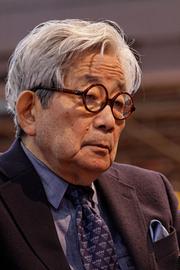 |
|
| Kenzaburo Oe | |
Nobel literature laureate Kenzaburo Oe, "whose darkly poetic novels were built from his childhood memories during Japan's postwar occupation and from being the parent of a disabled son," died March 3, the Associated Press reported. He was 88. His publisher, Kodansha, confirmed his death, but did not give details.
In 1994, Oe became the second Japanese author awarded the Nobel Prize in literature (after Yasunari Kawabata in 1968). The Swedish Academy cited Oe for his works of fiction, in which "poetic force creates an imagined world where life and myth condense to form a disconcerting picture of the human predicament today."
Childhood wartime memories strongly influenced the story that marked Oe's literary debut, "The Catch," which was published in 1958 when Oe was still a university student and won Japan's prestigious Akutagawa Prize for new writers. He also wrote nonfiction books about Hiroshima's devastation and rise after the 1945 U.S. atomic bombing, as well as about Okinawa and its postwar U.S. occupation. As an activist, Oe campaigned for peace and anti-nuclear causes and often appeared at rallies.
His "most searing works were influenced by the birth of Oe's mentally disabled son in 1963. A Personal Matter, published a year later, is the story of a father coming to terms through darkness and pain with the birth of a brain-damaged son. Several of his later works have a damaged or deformed child with symbolic significance, with the stories and characters evolving and maturing as Oe's son aged," the AP noted.
"I was trained as a writer and as a human being by the birth of my son," he told the Guardian in 2005. His son, Hikari, went on to become a musical prodigy and an award-winning composer. Oe has said his son's music sold "better than any of my novels, and I'm proud of that."
Oe wrote about many fictional fathers with disabled sons, in books like The Silent Cry and A Quiet Life, which was adapted into a film by Oe's sister-in-law, the director Juzo Itami, with a score based on Hikari's compositions, the Guardian noted. In 1995, he wrote a bestselling essay collection, A Healing Family, in which he credited Hikari for teaching him the healing power of art.
Henry Miller once likened Oe to Dostoevsky, in his "range of hope and despair," while Edward Said, a friend for 20 years, noted his "extraordinary power of sympathetic understanding," the Guardian reported. Fellow Nobel laureate Kazuo Ishiguro once described him as "genuinely decent, modest, surprisingly open and honest, and very unconcerned about fame," while his translator, John Nathan, credited him with "creating a language of his own, in the manner of Faulkner and few Japanese writers before him."
In the early 1990s, Oe vowed to stop writing fiction, saying Hikari had now found his own voice, and that the three books in his the Flaming Green Tree trilogy signaled his career coming full circle. But after winning the Nobel Prize, he continued to write into his late 70s, with his final book, Bannen Youshiki shū (In Reito Sutairu) (In Late Style) published in 2013.
Novelist Fuminori Nakamura, who in 2010 received the now-discontinued Oe Kenzaburo award, told Kyodo News that his death was "truly a loss to the whole world.... He was a writer who wrote deeply on people's inner lives, and his work was hugely impressive."

